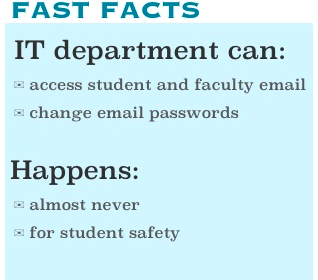School email access policy
Careful with that passionate, romantically-worded email to your crush. As with most other email-providing institutions, Harker’s Intellectual Technology (IT) department can access the contents of student and faculty Google accounts.
Director of IT and Learning Innovation and Design Daniel Hudkins said that he can change students’ school email passwords to access the contents of Google accounts.
“Now the next question is fairly obvious: how often does that happen? Never,” Hudkins said.
Student safety is a possible reason for searching through a student’s emails. Hudkins stated that he would consult the administration before entering an account.
“In other words, this is not something that would ever happen casually,” Hudkins said.
Student and faculty email accounts are provided by Google Apps for Education (GAFE), a free product that allows Harker to give students email addresses under the students.harker.org email domain. It also provides access to applications such as Google Drive and Google Docs, which are tied to a user’s email password.
Hudkins advised privacy-concerned students to send private messages from personal email accounts. He compared institutional email accounts to school lockers, stating that both are the property of the school.
“You have a reasonable expectation of privacy which should not mistaken for confidentiality,” Hudkins said.
Linus Li (9) felt that the school’s policy regarding Google accounts invaded his privacy.
“Even though some people don’t use their school email, the school email is a way for me to connect with my friends, and we have a lot of personal stuff on there,” Linus said. “The fact that they can see anything about my email is extremely frustrating.”
Eric Cheung (12) feels neutral about the school having free access to his email account.
“I tend to not put personal things in that email,” he said. “I feel ok [about it], because we’re not restricted to using that email.”
When regarding emails, there is no privacy in their email accounts. Once sent, the sender may choose to do what they desire with it.
This piece was originally published in the pages of The Winged Post on Nov. 21, 2014.
Emma Yu (9) is a reporter for The Winged Post. In her free time, she usually draws, surfs the internet, and hopes for no tests in the upcoming weeks of...

Mariam Sulakian is the Features Editor of Harker Aquila. She has been a member of the journalism program for four years and appreciates the opportunities...


















![“[Building nerf blasters] became this outlet of creativity for me that hasn't been matched by anything else. The process [of] making a build complete to your desire is such a painstakingly difficult process, but I've had to learn from [the skills needed from] soldering to proper painting. There's so many different options for everything, if you think about it, it exists. The best part is [that] if it doesn't exist, you can build it yourself," Ishaan Parate said.](https://harkeraquila.com/wp-content/uploads/2022/08/DSC_8149-900x604.jpg)




![“When I came into high school, I was ready to be a follower. But DECA was a game changer for me. It helped me overcome my fear of public speaking, and it's played such a major role in who I've become today. To be able to successfully lead a chapter of 150 students, an officer team and be one of the upperclassmen I once really admired is something I'm [really] proud of,” Anvitha Tummala ('21) said.](https://harkeraquila.com/wp-content/uploads/2021/07/Screen-Shot-2021-07-25-at-9.50.05-AM-900x594.png)







![“I think getting up in the morning and having a sense of purpose [is exciting]. I think without a certain amount of drive, life is kind of obsolete and mundane, and I think having that every single day is what makes each day unique and kind of makes life exciting,” Neymika Jain (12) said.](https://harkeraquila.com/wp-content/uploads/2017/06/Screen-Shot-2017-06-03-at-4.54.16-PM.png)








![“My slogan is ‘slow feet, don’t eat, and I’m hungry.’ You need to run fast to get where you are–you aren't going to get those championships if you aren't fast,” Angel Cervantes (12) said. “I want to do well in school on my tests and in track and win championships for my team. I live by that, [and] I can do that anywhere: in the classroom or on the field.”](https://harkeraquila.com/wp-content/uploads/2018/06/DSC5146-900x601.jpg)
![“[Volleyball has] taught me how to fall correctly, and another thing it taught is that you don’t have to be the best at something to be good at it. If you just hit the ball in a smart way, then it still scores points and you’re good at it. You could be a background player and still make a much bigger impact on the team than you would think,” Anya Gert (’20) said.](https://harkeraquila.com/wp-content/uploads/2020/06/AnnaGert_JinTuan_HoHPhotoEdited-600x900.jpeg)

![“I'm not nearly there yet, but [my confidence has] definitely been getting better since I was pretty shy and timid coming into Harker my freshman year. I know that there's a lot of people that are really confident in what they do, and I really admire them. Everyone's so driven and that has really pushed me to kind of try to find my own place in high school and be more confident,” Alyssa Huang (’20) said.](https://harkeraquila.com/wp-content/uploads/2020/06/AlyssaHuang_EmilyChen_HoHPhoto-900x749.jpeg)



